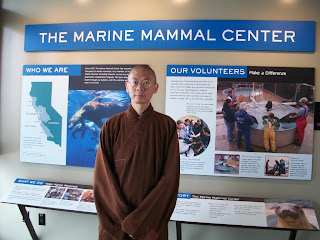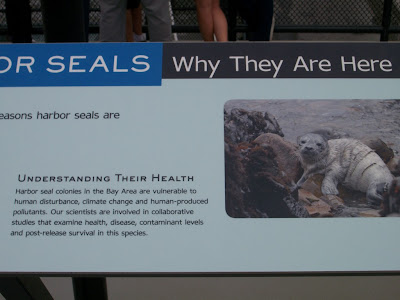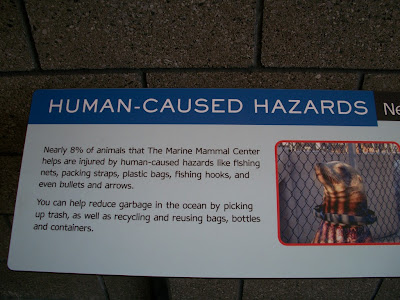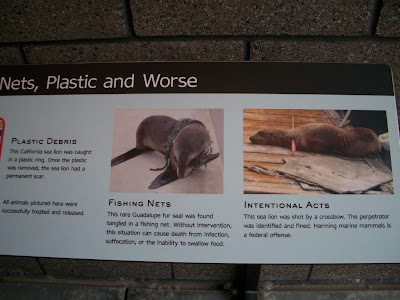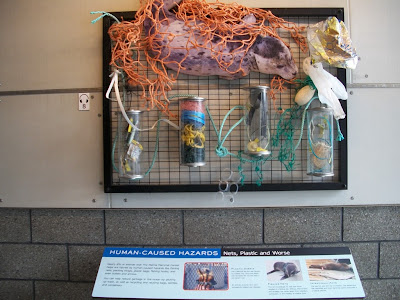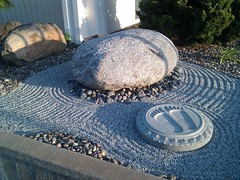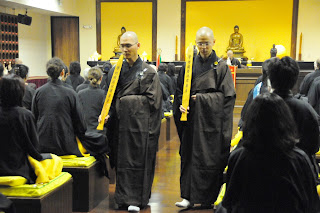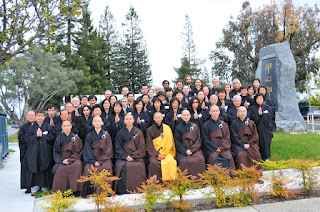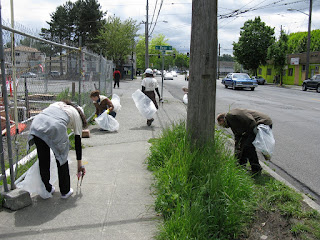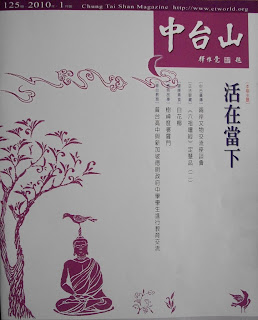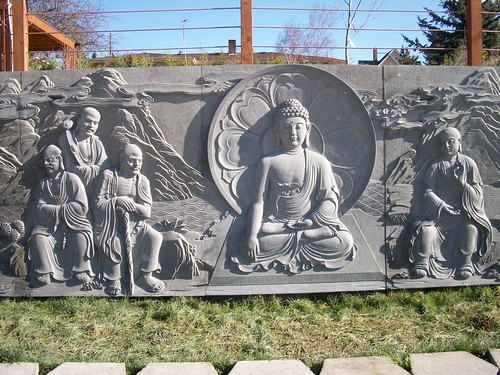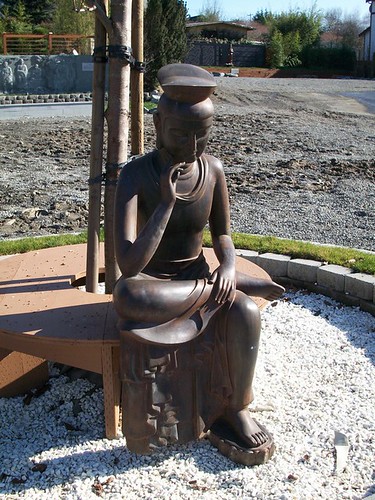和合之體在於心念。
要達到和合,先要自己與自己和合。
要與自己和合,先要覺照自心,知道自己的心念,感受,想法,心要清楚。
進一步,心要明白,要知道這些是善念、惡念,是貪念、瞋念,是有利於修行或有礙於修行的念頭。否則,縱使知道自己的念頭,還是善惡不分,知見不明。
第三步,不論善念惡念,自己的優點缺點,心不與它相應,不理它。了知,但不反應。
我們不是修行嗎?那不是要戰勝惡念嗎?
其實,不理它就是禪。貪念唯有貪之不止,才是貪。瞋念唯有自我相續壯大,才會傷人。不理它,它就無力,自己消滅了。這是不戰而勝,這是內在的和合。
Saturday, September 4, 2010
Harmony (2)
The essence harmony is in our thoughts.
Achieving harmony begins with being in harmony with ourselves.
To do so we must become aware of our inner thoughts. Begin by sitting quietly, becoming aware of our thoughts, feelings, ideas.
Next, we observe clearly the nature of these thoughts: good thoughts? Bad thoughts? Harmful thoughts? False understanding? Without clear understanding, we can't tell right from wrong. Which thoughts are obstacles to our practice? Which thoughts are beneficial?
Thirdly, we do not REACT to these thoughts, whether good or bad. We simply accept them as the reality of who I am at this moment. Accept yourself, both the faults and the virtues.
Aren't we supposed to improve ourselves? Why don't we try to conquer these bad thoughts and bad habits? This is the Zen way. By NOT reacting, we conquer them without fighting. Greed is only greed when we let it continue. Anger only harms when we let it feed on itself. By not reacting, they have no power, and your mind is at peace, inner harmony is achieved.
Achieving harmony begins with being in harmony with ourselves.
To do so we must become aware of our inner thoughts. Begin by sitting quietly, becoming aware of our thoughts, feelings, ideas.
Next, we observe clearly the nature of these thoughts: good thoughts? Bad thoughts? Harmful thoughts? False understanding? Without clear understanding, we can't tell right from wrong. Which thoughts are obstacles to our practice? Which thoughts are beneficial?
Thirdly, we do not REACT to these thoughts, whether good or bad. We simply accept them as the reality of who I am at this moment. Accept yourself, both the faults and the virtues.
Aren't we supposed to improve ourselves? Why don't we try to conquer these bad thoughts and bad habits? This is the Zen way. By NOT reacting, we conquer them without fighting. Greed is only greed when we let it continue. Anger only harms when we let it feed on itself. By not reacting, they have no power, and your mind is at peace, inner harmony is achieved.
Harmony (1)
In Zen we often say, "wherever you are, that is where your mind is."
How do we practice this? There are many ways. Here we talk about one: harmony.
Harmony with the environment, harmony with situations, harmony with people.
Harmony means:
When you are sitting on the meditation stool, that is the best place for you to be.
When your legs hurt, that is exactly what you need for your practice.
When you talk to a person, that is the most important person for you at this moment.
Every moment, any place, practice this way with a clear mind, you are in harmony with the world.
How do we practice this? There are many ways. Here we talk about one: harmony.
Harmony with the environment, harmony with situations, harmony with people.
Harmony means:
When you are sitting on the meditation stool, that is the best place for you to be.
When your legs hurt, that is exactly what you need for your practice.
When you talk to a person, that is the most important person for you at this moment.
Every moment, any place, practice this way with a clear mind, you are in harmony with the world.
和合 (一)
所謂人在那裏,心在那裏。如何修?
方法很多,略舉其一:和合。與人和合,與事和合,與世和合。
在禪堂時,這就是最棒的地方。若不是,心則四處紛飛。
打坐腿痛,這就是你現在最需要的修行。
面對人,他就是現在最重要的人。
如此時時處處,以清淨心,覺照心,面對人事物,就是人在那裏心在那裏,也能與一切和合。
方法很多,略舉其一:和合。與人和合,與事和合,與世和合。
在禪堂時,這就是最棒的地方。若不是,心則四處紛飛。
打坐腿痛,這就是你現在最需要的修行。
面對人,他就是現在最重要的人。
如此時時處處,以清淨心,覺照心,面對人事物,就是人在那裏心在那裏,也能與一切和合。
Friday, July 23, 2010
Shifu visits Marine Mammal Center
On Monday, July 19, Shifu Jian Hu and a few disciples, accompanied by new CTZen Center member, Charlotte Bear, visited the Marine Mammal Center in Sausalito. It is the largest Marine Mammal Hospital in the world, with a group of very dedicated doctors, researchers, and team of volunteers that accomplishes something quite amazing. However, what is even more amazing is what humans do, out of ignorance, to these animals. Shifu asked Charlotte to write the following report:
 Marine Mammals teach us about how our choices here at home affect the health of the oceans and all the living beings within them. Master Jian Hu urges CTZen Center members to learn about The Marine Mammal Center--its mission and the education it provides about the impact of our human choices on the coast.
Marine Mammals teach us about how our choices here at home affect the health of the oceans and all the living beings within them. Master Jian Hu urges CTZen Center members to learn about The Marine Mammal Center--its mission and the education it provides about the impact of our human choices on the coast.
Our planet is almost 80% oceans. With about 6 billion human beings now living on the planet, the impact of our presence on the land impacts the ocean environment tremendously. In recent years, the oceans and all of the living beings within them, not to mention the living beings who depend upon the coast lines, are now facing increasing perils. Much of those dangers are because of mindless human impact upon the planet. Education about the ocean environment and our interdependence with ocean creatures is needed now more than ever.
Increasingly, fish supplies are being depleted by over-fishing, global warming and oil spills, which produce micro-organisms that consume oxygen in the water available for fish to breathe. New increases in contaminants in ocean waters are causing mysterious rises in toxic algae blooms, producing seizures and brain damage in sea lions, for example. Sea lions are an "indicator species," revealing trends in the health of the entire ocean environment. Whales have been beaching more commonly, and upon examination after death, reveal that they swallow large amounts of netting and plastics that have been dumped into the waters. Sea turtles are found dead too often, having eaten plastic bags, which resemble jelly fish, their natural food, and then starve. Rates of cancer have been rising in seals and sea lions, which correspond to human cancer. If allowed to continue unchecked, the food web itself in the oceans will begin to collapse as a result of human consumption and pollution. Fortunately, some people are working hard to intervene and to educate others.
One place that leads world marine science in understanding the impact of human choices on the oceans is The Marine Mammal Center (TMMC), the largest marine mammal hospital, research and education center in the world. Tucked away in the Marin Headlands, near Sausalito, north of the Golden Gate bridge, TMMC runs a year-round operation rescuing, rehabilitating and releasing marine animals, such as California Sea Lions, Stellar Sea Lions, Elephant Seals, Harbor Seals, Northern Fur Seals, dolphins, migrating whales and sea otters. It rescues orphaned, injured, sick and stranded animals from 600 miles of California coastline by deploying a fleet of rescue trucks and volunteers out of several "stranding outposts," stretching from San Luis Obisbo to Mendocino County. The main hospital is in Sausalito, and last year, when the facility opened, it received much public acclaim and won a Bay Area Green Architecture Award for its green building/engineering design.
We, the Zen Center group, was led on a tour by the center's Executive Director, Dr. Jeff Boehm. They learned about the centers' history as a converted missile base to a marine mammal hospital on public lands overlooking and protecting the coast at Rodeo Beach. They learned about marine mammals, animal medicine, volunteer programs, leadership development and education at the center. Charlotte Bear is a volunteer at the center in animal care, education and the Speakers' Bureau. Oliva and Judy wanted to become members on the spot, and they took home information for their family members and the CTZen Center about volunteering and donating. Master Jian Hu talked about the center in the Level I Buddhism class that evening, and he encouraged disciples to get to know the story of the center. This article is intended to provide information that assists Master Jian Hu's request.

The center offers year-round community education about ocean conservation, marine mammal protection and marine science. It hosts interns from all over the world, and it has an outstanding youth program as well as kids' outreach. It also shares vital science, dating back 20 years, about marine mammals and ocean changes. The doctors at TMMC are some of the best in their field, and yet they live humbly in coast guard quarters and work tirelessly day in and out treating the center's patients and developing state of the art surgery techniques.
Almost 1,000 volunteers keep the center running, working in animal care, education, outreach, development, communications, youth program and special events. In 2009, the center treated 1,700 patients. About 50% of these endangered species survived the trauma they had suffered and were released. That's 50% more than would have survived otherwise. The center is open everyday to the public for free, with low-cost tours available. For more information about The Marine Mammal Center, visit www.marinemammalcenter.org.
 Marine Mammals teach us about how our choices here at home affect the health of the oceans and all the living beings within them. Master Jian Hu urges CTZen Center members to learn about The Marine Mammal Center--its mission and the education it provides about the impact of our human choices on the coast.
Marine Mammals teach us about how our choices here at home affect the health of the oceans and all the living beings within them. Master Jian Hu urges CTZen Center members to learn about The Marine Mammal Center--its mission and the education it provides about the impact of our human choices on the coast.Our planet is almost 80% oceans. With about 6 billion human beings now living on the planet, the impact of our presence on the land impacts the ocean environment tremendously. In recent years, the oceans and all of the living beings within them, not to mention the living beings who depend upon the coast lines, are now facing increasing perils. Much of those dangers are because of mindless human impact upon the planet. Education about the ocean environment and our interdependence with ocean creatures is needed now more than ever.
Increasingly, fish supplies are being depleted by over-fishing, global warming and oil spills, which produce micro-organisms that consume oxygen in the water available for fish to breathe. New increases in contaminants in ocean waters are causing mysterious rises in toxic algae blooms, producing seizures and brain damage in sea lions, for example. Sea lions are an "indicator species," revealing trends in the health of the entire ocean environment. Whales have been beaching more commonly, and upon examination after death, reveal that they swallow large amounts of netting and plastics that have been dumped into the waters. Sea turtles are found dead too often, having eaten plastic bags, which resemble jelly fish, their natural food, and then starve. Rates of cancer have been rising in seals and sea lions, which correspond to human cancer. If allowed to continue unchecked, the food web itself in the oceans will begin to collapse as a result of human consumption and pollution. Fortunately, some people are working hard to intervene and to educate others.
One place that leads world marine science in understanding the impact of human choices on the oceans is The Marine Mammal Center (TMMC), the largest marine mammal hospital, research and education center in the world. Tucked away in the Marin Headlands, near Sausalito, north of the Golden Gate bridge, TMMC runs a year-round operation rescuing, rehabilitating and releasing marine animals, such as California Sea Lions, Stellar Sea Lions, Elephant Seals, Harbor Seals, Northern Fur Seals, dolphins, migrating whales and sea otters. It rescues orphaned, injured, sick and stranded animals from 600 miles of California coastline by deploying a fleet of rescue trucks and volunteers out of several "stranding outposts," stretching from San Luis Obisbo to Mendocino County. The main hospital is in Sausalito, and last year, when the facility opened, it received much public acclaim and won a Bay Area Green Architecture Award for its green building/engineering design.
We, the Zen Center group, was led on a tour by the center's Executive Director, Dr. Jeff Boehm. They learned about the centers' history as a converted missile base to a marine mammal hospital on public lands overlooking and protecting the coast at Rodeo Beach. They learned about marine mammals, animal medicine, volunteer programs, leadership development and education at the center. Charlotte Bear is a volunteer at the center in animal care, education and the Speakers' Bureau. Oliva and Judy wanted to become members on the spot, and they took home information for their family members and the CTZen Center about volunteering and donating. Master Jian Hu talked about the center in the Level I Buddhism class that evening, and he encouraged disciples to get to know the story of the center. This article is intended to provide information that assists Master Jian Hu's request.

Almost 1,000 volunteers keep the center running, working in animal care, education, outreach, development, communications, youth program and special events. In 2009, the center treated 1,700 patients. About 50% of these endangered species survived the trauma they had suffered and were released. That's 50% more than would have survived otherwise. The center is open everyday to the public for free, with low-cost tours available. For more information about The Marine Mammal Center, visit www.marinemammalcenter.org.
Friday, July 16, 2010
Backyard organic garden; Prison garden
Pasadena family turns their front and back yards into an productive organic garden that provides 60%+ of their food supply--all fresh, all year round!
And in another news, a lady in San Francisco started a "Prison Garden" project: what a simple but amazing idea. See article:
Prison Garden: Feeding inmates inside and Food Banks outside
Seeing your veggies grow must have transformational effects on the inmates, as well.
And in another news, a lady in San Francisco started a "Prison Garden" project: what a simple but amazing idea. See article:
Prison Garden: Feeding inmates inside and Food Banks outside
Seeing your veggies grow must have transformational effects on the inmates, as well.
Tuesday, June 22, 2010
Grand Master Wei Chueh visits the US in October
Everyone,
Good news: there is a GOOD chance that the Grand Master Wei Chueh may come to visit the USA himself in October for the 10th anniversary of Buddha Gate Monastery and for the Inauguration of several monasteries. Of course, that depends on his health condition; if he cannot come then, then at least the Abbot Jian Deng Shifu will.
We are also encouraging people to go to Texas on 10/7 for the inauguration and consecration of the Texas Pagoda Monastery (and the future Chung Tai Retreat Center for the US) that weekend.
好消息:中台山導師惟覺大和尚十月份可能親自來美弘法!
Please pass on this news.
Saturday, May 29, 2010
Zen Center Fleeting Moments
| |||||||||||||||||||||||||||||||||||||
Thursday, May 27, 2010
Chung Tai Zen Center of Sunnvyale
2010 Spring Zen-7 Retreat
Initiation Verse
Cherry blossom welcomes you in the wake of springGood cultivators, for this Zen-Seven Initiation, how does the last verse go?
Its fragile beauty embodies the Zen spirit
With both hands you try to hold it, to no avail
Petals fallen still seem colorful and vibrant
Though you may see through the veil in all phenomena
Who is the one watching the cherry blossom?Begin—
中台山太谷精舍2010年度春季精進禪七起七法語
櫻含春曉待嘉賓諸位知識,即今起七一事,最後一句又怎麼說法?
薄姿遙曳蘊禪心
雙手欲捧留不住
前塵餘影猶繽紛
若能看破法中塵 明日觀櫻是何人起—
----------------------------
April 4, 2010
Completion Verse
In the morning you greet the spring mist;Good cultivators, for the completion of this Zen-Seven Retreat, how does the last verse go?
In the evening you see off autumn wind.
Life is a chess game,
All the calculations end in emptiness.
The guests of life pass through endlessly—
Where is the owner hiding?
Riding on the ox you’ve tamed the ox,
Only to return to the same place.
The person and the ox both empty, there is infinite meaning;
The person and the ox both present, you awaken the world effortlessly.
Done—
解七法語
朝迎春嵐暮送秋
棋盤人生空運籌
客塵川流主何在
騎牛牧牛繞一周
諸位知識,即今解七一事,最後一句又怎麼說法?
人牛俱空無盡意
人牛俱現逍遙遊
解—
Wednesday, May 26, 2010
四十二章經-green annotations
佛經中有那些對環保觀念的指導?我們試做一部「綠佛經」,請大家提供意見,或自己選一部佛經嘗試!將來希望能編一部「心淨國土淨--佛經環保經文選錄」。
佛說四十二章經 後漢迦葉摩騰、竺法蘭 合譯
經 序
第一章 出家證果
佛言:辭親出家,識心達本,解無為法,名曰沙門。常行二百五十戒,進止清淨,為四真道行,成阿羅漢。阿羅漢者,能飛行變化,曠劫壽命,住動天地。次為阿那含,阿那含者,壽終靈神上十九天,證阿羅漢。次為斯陀含,斯陀含者,一上一還,即得阿羅漢。次為須陀洹,須陀洹者,七死七生,便證阿羅漢。愛欲斷者,如四肢斷,不復用之。
第二章 斷欲絕求
佛言:出家沙門者,斷欲去愛,識自心源。達佛深理,悟無為法。內無所得,外無所求。心不繫道,亦不結業。無念無作,非修非證。不歷諸位而自崇最,名之為道。
第三章 割愛去貪
第四章 善惡並明
佛言:眾生以十事為善,亦以十事為惡。何等為十?身三、口四、意三。身三者,殺、盜、淫。口四者,兩舌、惡口、妄言、綺語。意三者,嫉、恚、癡。如是十事,不順聖道,名十惡行;是惡若止,名十善行耳。
第五章 轉重令輕
佛言:人有眾過,而不自悔,頓息其心。罪來赴身,如水歸海,漸成深廣。若人有過,自解知非,改惡行善,罪自消滅。如病得汗,漸有痊損耳。
第六章 忍惡無瞋
佛言:惡人聞善,故來撓亂者。汝自禁息,當無瞋責。彼來惡者而自惡之。
第七章 惡還本身
第八章 塵唾自污
第九章 返本會道
佛言:博聞愛道,道必難會。守志奉道,其道甚大。
第十章 喜施獲福
佛言:睹人施道,助之歡喜,得福甚大。沙門問曰:此福盡乎。佛言:譬如一炬之火,數百千人,各以炬來分取,熟食除冥,此炬如故。福亦如之。
第十一章 施飯轉勝
佛言:飯惡人百,不如飯一善人。飯善人千,不如飯一持五戒者。飯五戒者萬,不如飯一須陀洹。飯百萬須陀洹,不如飯一斯陀含。飯千萬斯陀含,不如飯一阿那含。飯一億阿那含,不如飯一阿羅漢。飯十億阿羅漢,不如飯一辟支佛。飯百億辟支佛,不如飯一三世諸佛。飯千億三世諸佛,不如飯一無念無住無修無證之者。
第十二章 舉難勸修
佛言:人有二十難。貧窮布施難。豪貴學道難。棄命必死難。得睹佛經難。生值佛世難。忍色忍欲難。見好不求難。被辱不瞋難。有勢不臨難。觸事無心難。廣學博究難。除滅我慢難。不輕末學難。心行平等難。不說是非難。會善知識難。見性學道難。隨化度人難。睹境不動難。善解方便難。
第十三章 問道宿命
沙門問佛:以何因緣,得知宿命,會其至道。佛言:淨心守志,可會至道。譬如磨鏡,垢去明存,斷欲無求,當得宿命。
第十四章 請問善大
第十五章 請問力明
沙門問佛:何者多力,何者最明。佛言:忍辱多力,不懷惡故,兼加安健。忍者無惡,必為人尊。心垢滅盡,淨無瑕穢,是為最明。未有天地,逮於今日,十方所有,無有不見,無有不知,無有不聞,得一切智,可謂明矣。
第十六章 捨愛得道
第十七章 明來暗謝
佛言:夫見道者,譬如持炬,入冥室中,其冥即滅,而明獨存。學道見諦,無明即滅,而明常存矣。
第十八章 念等本空
佛言:吾法念無念念,行無行行,言無言言,修無修修。會者近爾,迷者遠乎。言語道斷,非物所拘。差之毫釐,失之須臾。
第十九章 假真並觀
第二十章 推我本空
佛言:當念身中四大,各自有名,都無我者,我既都無,其如幻耳。
第二十一章 名聲喪本
佛言:人隨情欲,求於聲名,聲名顯著,身已故矣。貪世常名,而不學道,枉功勞形。譬如燒香,雖人聞香,香之燼矣,危身之火,而在其後。
第二十二章 財色招苦
佛言:財色於人,人之不捨。譬如刀刃有蜜,不足一餐之美。小兒舐之,則有割舌之患。
第二十三章 妻子甚獄
佛言:人繫於妻子舍宅,甚於牢獄。牢獄有散釋之期,妻子無遠離之念。情愛於色,豈憚驅馳?雖有虎口之患,心存甘伏,投泥自溺,故曰凡夫。透得此門,出塵羅漢。
第二十四章 色欲障道
佛言:愛欲莫甚於色,色之為欲,其大無外。賴有一矣,若使二同,普天之人,無能為道者矣。
第二十五章 欲火燒身
第二十六章 天魔嬈佛
天神獻玉女於佛,欲壞佛意。佛言:革囊眾穢,爾來何為?去,吾不用。天神愈敬,因問道意。佛為解說,即得須陀洹果。
第二十七章 無著得道
第二十八章 意馬莫縱
佛言:慎勿信汝意,汝意不可信。慎勿與色會,色會即禍生。得阿羅漢已,乃可信汝意。
第二十九章 正觀敵色
佛言:慎勿視女色,亦莫共言語。若與語者,正心思念:我為沙門,處於濁世,當如蓮華,不為泥汙。想其老者如母,長者如姊,少者如妹,稚者如子。生度脫心,息滅惡念。
第三十章 欲火遠離
佛言:夫為道者,如被乾草,火來須避。道人見欲,必當遠之。
第三十一章 心寂欲除
佛言:有人患淫不止,欲自斷陰。佛謂之曰:若斷其陰,不如斷心。心如功曹,功曹若止,從者都息。邪心不止,斷陰何益?佛為說偈:欲生於汝意,意以思想生;二心各寂靜,非色亦非行。佛言:此偈是迦葉佛說。
第三十二章 我空怖滅
第三十三章 智明破魔
佛言:夫為道者,譬如一人與萬人戰。挂鎧出門,意或怯弱,或半路而退,或格鬥而死,或得勝而還。沙門學道,應當堅持其心,精進勇銳,不畏前境。破滅眾魔,而得道果。
第三十四章 處中得道
沙門夜誦迦葉佛遺教經,其聲悲緊,思悔欲退。佛問之曰:汝昔在家,曾為何業?對曰:愛彈琴。佛言:弦緩如何?對曰:不鳴矣。弦急如何?對曰:聲絕矣。急緩得中如何?對曰:諸音普矣。佛言:沙門學道亦然。心若調適,道可得矣。於道若暴,暴即身疲。其身若疲,意即生惱。意若生惱,行即退矣。其行既退,罪必加矣。但清淨安樂,道不失矣。
第三十五章 垢淨明存
佛言:如人鍛鐵,去滓成器,器即精好。學道之人,去心垢染,行即清淨矣。
第三十六章 展轉獲勝
佛言:人離惡道,得為人難。既得為人,去女即男難。既得為男,六根完具難。六根既具,生中國難。既生中國,值佛世難。既值佛世,遇道者難。既得遇道,興信心難。既興信心,發菩提心難。既發菩提心,無修無證難[11]。
第三十七章 念戒近道
佛言:佛子離吾數千里,憶念吾戒,必得道果。在吾左右,雖常見吾,不順吾戒,終不得道。
第三十八章 生即有滅
佛問沙門:人命在幾間?對曰:數日間。佛言:子未知道。復問一沙門:人命在幾間?對曰:飯食間。佛言:子未知道。復問一沙門:人命在幾間?對曰:呼吸間。佛言:善哉!子知道矣!
第三十九章 教誨無差
佛言:學佛道者,佛所言說,皆應信順。譬如食蜜,中邊皆甜。吾經亦爾。
第四十章 行道在心
佛言:沙門行道,無如磨牛,身雖行道,心道不行。心道若行,何用行道。
第四十一章 直心出欲
佛言:夫為道者,如牛負重,行深泥中,疲極不敢左右顧視。出離淤泥,乃可蘇息。沙門當觀情欲,甚於淤泥。直心念道,可免苦矣。
第四十二章 達世知幻
佛言:吾視王侯之位,如過隙塵。視金玉之寶,如瓦礫。視紈素之服,如敝帛。視大千界,如一訶子。視阿耨池水,如塗足油。視方便門,如化寶聚。視無上乘,如夢金帛。視佛道,如眼前華。視禪定,如須彌柱。視涅槃,如晝夕寤。視倒正,如六龍舞。視平等,如一真地。視興化,如四時木[12]。諸大比丘,聞佛所說,歡喜奉行。
[4] 同前,塵唾自污章則更顯明,雖然此處指害人之業力,對環境染污的因果亦必回到自身。
[5] 環保雖不易,但志與道合者大,以心淨國土淨為領導原則,則志與道合,必能有成。
[6] 愛欲盛則心水濁。而今世界河流大海悉皆污濁,豈不是人之貪欲所使?
[7] 天地自然皆無常,如自己身體,不能讓人類無限制的濫用。以菩提靈覺觀之,不但能契悟自心,亦能了解自然之法則。
[8] 人之貪欲不止,如逆風執炬,大自然必反撲傷己。
[10] 佛告訴我們,人所有一切憂怖,皆從欲生。我們對自然環境、天災人禍的焦慮,亦必要追溯到人之欲望方能解決。
[11] 生中國者,文化環境適合佛法茁長之處。今者無論何地,能遇佛法,即是因中得逢淨土,事上淨土,則要自己努力。
[12] 環境是依報,由眾生心而起;重視環境,因為未出三界,必須要藉境修心;也因為眾生執迷,因境受眾苦。但也不可忘記,三千大千世界,亦如微塵,如幻化,非假非真,唯以這念清淨心照破我法二執,見實相無相,方能常住寂光淨土。
Tuesday, May 25, 2010
Buddha Jewel cleans local street
Though it was a little bit chilly and windy, Jiandu Shifu led eight volunteers from Buddha Jewel Monastery to do street cleaning last Sunday afternoon. Holding the tongs and garbage bags, also with a cart, they walked along the Rainier Ave S to pick up paper, cigarette butts, beer bottles, and all sorts of garbage.
Many shop owners and passersby appreciated what volunteers had done. At the end of this 1.5 hours street cleaning event, five full garbage bags were collected.
儘管風強天冷,八名來自佛寶寺的義工在法師帶領下,在周日下午清掃精舍所在的 Rainier S 大街。每個人身穿佛寶寺背心t-shirt,手拿鉗子及垃圾袋,專注的撿拾起路旁的垃圾。
經云:「心淨國土淨」。這個每月一次的街道清潔活動,不只是回饋社區、關懷地球的環保活動,同時也是藉由撿拾外在垃圾,進而反思要除去心中的垢染,以達「外除穢物,內除心垢」的目的。
許多過往路人及商家對於精舍的街道清潔服務表示感謝。在一個半小時的活動結束時,共撿拾了五大袋的垃圾,成績斐然。
Friday, April 30, 2010
English Dharma Lectures
It seems that there has been preciously little English Dharma material from Chung Tai. We'll try to amend this situation gradually. Here are some old and recently posted material. We'll keep on updating this post as new lectures are posted.
Dharma Lectures by the Grand Master Wei Chueh
(translated by the Chung Tai Translation Committee)
Four lectures are currently available in PDF form from the Chung Tai World website here.
They included:
Dharma Lectures by Jianhu Shifu:
Dharma Lectures by the Grand Master Wei Chueh
(translated by the Chung Tai Translation Committee)
Four lectures are currently available in PDF form from the Chung Tai World website here.
They included:
- From Bodhi Mind to Ultimate Enlightenment
- Gradual Cultivation and Sudden Enlightenment
- Abide in the Mahayana Mind
- Buddhism and Vegetarianism
Dharma Lectures by Jianhu Shifu:
- Nine Abiding Mind (Stages to Samadhi)
- Preservation and Adaptation: Challenges of American Buddhism and the Chinese Buddhist Experience
Wednesday, March 24, 2010
Ten Oxherding Poems 十牛圖頌
The Ten Oxherding Pictures/Poems originated in the Sung Dynasty, showing the stages of Zen cultivation from Seeking the Ox (starting on the spiritual path to find true self), attaining enlightenment, and ends in the bodhisattva practice. Both the Zen Center of Sunnyvale and Buddha Jewel Monastery have the poems (Chinese original and our English translation) and accompanying paintings, specially commissioned for each monastery, in the Zen Halls. (See the paintings here.)
Shifu will be posting a tweeter (shortened) version of these poems in the following days. Interesting challenge! Your suggestions welcome.
Zen Master Kuo An:
1. Searching for the Ox
The Chinese originals are here:
十牛圖頌 廓庵禪師
(一) 尋牛:
Shifu will be posting a tweeter (shortened) version of these poems in the following days. Interesting challenge! Your suggestions welcome.
Zen Master Kuo An:
1. Searching for the Ox
Brushing aside thick grasses I pursue him,2. Discovering the Footprints
In wide rivers, distant mountains, and paths without end.
Exhausted, unable to find him anywhere,
I only hear evening cicadas in the maple trees.
Scores of footprints in the forests and by the streams,3. Sighting of the Ox
Do you see them scattered amid the fragrant grass?
Even deep in the remote mountains,
How can he conceal his enormous snout?
A golden oriole trills on the branch,4. Catching the Ox
The sun is warm, the wind mild,
and the lakeside willow green.
Now there is nowhere for the ox to escape!
Yet what artist can paint his majestic head and horns?
With extraordinary effort I catch the ox,5. Taming the Ox
Strong of body and spirit, he is not easily subdued.
At times, he scales the lofty plains,
Then hides deep within the cloud-like mist.
I must never let go of the whip and rein,6. Riding the Ox Home
Lest he stride down the dusty trail.
Having been well trained, the ox is docile;
He freely follows the master without the leash.
Mounting the ox I meander home;7. The Ox Transcended
The sound of my flute rides with the evening clouds.
Each beat and tune holds meaning profound;
No need for words if you understand this song.
Astride the ox I reach my native hill,8. Both Ox and Self Transcended
The ox has vanished, and I am free.
I dream until the sun is high;
The rein and whip lie idle in the barn.
Whip, rein, person, and ox merge into emptiness,9. Returning to the Source
No words can reach across this vast blue sky.
How can snow accrue on a burning stove?
Here finally, I walk with the Patriarchs.
Returning to one's root has taken much effort,10. Entering the World
Better to have acted blind and deaf from the start!
Dwelling in my hut, I see nothing without,
Rivers flow, flowers are red.
Barefoot and bare-chested, I mingle with the world;(Translated by the Chung Tai Translation Committee)
Though covered with dirt, I beam with joy.
Without the need for secret miraculous powers,
I make flowers bloom from withered wood.
The Chinese originals are here:
十牛圖頌 廓庵禪師
(一) 尋牛:
茫茫撥草去追尋,水闊山遙路更深,(二) 見跡:
力盡神疲無處覓,但聞楓樹晚蟬吟。
水邊林下跡偏多,芳草離披見也麼?(三) 見牛:
縱是深山更深處,遼天鼻孔怎藏他?
黃鸝枝上一聲聲,日暖風和岸柳青,(四) 得牛:
只此更無回避處,森森頭角畫難成。
竭盡神通獲得渠,心強力壯卒難除,(五) 牧牛:
有時纔到高原上,又入煙雲深處居。
鞭索時時不離身,恐伊縱步入埃塵,(六) 騎牛歸家:
相將牧得純和也,羈鎖無抑自逐人。
騎牛迤邐欲還家,羌笛聲聲送晚霞,(七) 忘牛存人:
一拍一歌無限意,知音何必鼓唇牙。
騎牛已得到家山,牛也空兮人也閑,(八) 人牛俱忘:
紅日三竿猶作夢,鞭繩空頓草堂間。
鞭索人牛盡屬空,碧天寥闊信難通,(九) 返本還源:
紅爐焰上爭容雪,到此方能合祖宗。
返本還源已費功,爭如直下似盲聾,(十) 入廛垂手:
庵中不見庵前物,水自茫茫花自紅。
露胸跣足入廛來,抹土塗灰笑滿腮,惟覺老和尚「十牛圖頌」的開示在中台網站上。
不用神仙真秘訣,直教枯木放花開。
Monday, February 22, 2010
中台山月刊 2010 1月號「活在當下」
這一期的「中台山」月刊,也有豐富的內容。為鼓勵大家深入閱讀,提出下列問題,請大家回答:
- 這一期的封面來自於那一個佛教的故事?
- 老和尚今年的春聯法語是什麼?
- 在去年十二月的「兩岸文物交流座談會」中,共有十八位發言人。下列各人的發言中,老和尚、佛學院院長見桅法師、北京故宮博物院副院長陳麗華、台北藝術大學林保堯所長、李祖原建築師、見護法師、文化大學陳清香教授各提到什麼重點?
- 老和尚二篇開示,皆以「六祖壇經.定慧品」為主題,恰好與週六的研經班一致。請將這二篇文章中老和尚的一些佳句或重點摘錄出來。
- 十一月時有那一所國外的中學來普台高中進行教育交流,彼此學習?
- 閱讀這一期法師及居士的文章,有何啟發?
- 李祖原建築師,為了設計中台禪寺,曾經特別考察了那些國家的宗教建築?他認為,文明可分為那三大系統?又如何從這三大系統的差異了解東、西方文化的不同特色?
- 在十月、十一月中,有那幾個不同國家的人士參訪了中台禪寺?
- 以下數句,分別出自何處?為這一期那一篇文章所引用?
- 「知者不惑,仁者不憂,勇者不懼」
- 「以有入空,四大俱融」
- 「一剎那經九百生滅」
- 「知所從來為知生,知所從去為知死」
- 「饑來喫飯,睏來即眠」
- 「寂然不動,感而遂通」
Wednesday, February 17, 2010
New Eighteen Arhats Wall & Maitreya Bodhisattva at BJM
The new Eighteen Arhats Wall at Buddha Jewel Monastery.
Also, the Maitreya Bodhisattva in the classic "contemplation pose". This is the saint that gave us the Yogacarin, or Consciousness-Only School of Buddhism. Anyone know why this Maitreya Bodhisattva is so different from the Chinese big-bellied Maitreya?
See the gallery here.
佛寶寺新的「十八羅漢牆」及「沉思彌勒」。
有人知道為何這尊彌勒菩薩這麼瘦,與中國的大肚彌勒不同嗎?
Also, the Maitreya Bodhisattva in the classic "contemplation pose". This is the saint that gave us the Yogacarin, or Consciousness-Only School of Buddhism. Anyone know why this Maitreya Bodhisattva is so different from the Chinese big-bellied Maitreya?
See the gallery here.
佛寶寺新的「十八羅漢牆」及「沉思彌勒」。
有人知道為何這尊彌勒菩薩這麼瘦,與中國的大肚彌勒不同嗎?
Monday, January 18, 2010
六祖壇經
六祖壇經因見滌法師回中台,由見護師擔任教授師。
是否有學員願意將每次上課的重點整理出來,提供給大家?
如:第一堂講「心平何勞持戒,行直何用坐禪」,有何重點?什麼是六祖真正的意義?「心平」是指什麼?為何心平何勞持戒?是不用持戒嗎?如何不誤解這二句話?
第二堂講「逆耳必是忠言」,與大家討論,提出那幾個觀點?要從那些方面來了解這句話?有何生活上的實例?
是否有學員願意將每次上課的重點整理出來,提供給大家?
如:第一堂講「心平何勞持戒,行直何用坐禪」,有何重點?什麼是六祖真正的意義?「心平」是指什麼?為何心平何勞持戒?是不用持戒嗎?如何不誤解這二句話?
第二堂講「逆耳必是忠言」,與大家討論,提出那幾個觀點?要從那些方面來了解這句話?有何生活上的實例?
十宗綱要-華嚴宗 1 & 2
我們已上了二堂的華嚴經。請學員回復:
- 三種華嚴經:六十華嚴,八十華嚴,四十華嚴,內容為何?一樣嗎?各有何特色?
- 自最初六十華嚴在 418 C.E. 譯出,華嚴宗的發展史上有何重要的事件?試製一表格列出年代及事項。(如:418 年,六十華嚴初譯出。643-712,華嚴三祖法藏法師。若年代不明,也試隨其歷史先後順序列出。)
- 摘錄華嚴經的佳句。如:每人可閱讀十卷。
Sunday, January 17, 2010
Half Day Meditation at Buddha Jewel Monastery
Monday, January 4, 2010
2009 Zen 7 Retreat Completion Verse


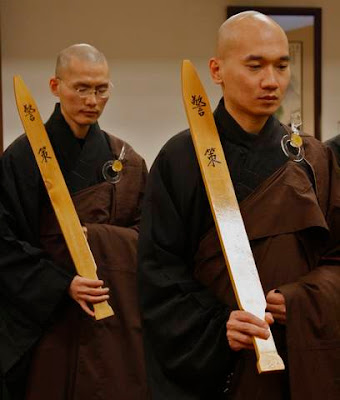


解七法語
長夜漫漫終見日 大地回春心亦春
初一十五月無二 能所一如塵非塵
遍觀法界情無情 全妄亦不礙全真
原來當前主人翁 正是昔日夢中人
諸位知識,即今解七一事,最後一句又怎麼說法?
要放心空無纖芥 要提山河一肩扛
解—
2009 Winter Zen-Seven Retreat
Completion Verse
January 1, 2010
The cold, dark night is over, the sun finally rises,Good cultivators, for the completion of this Zen-Seven, how does the last verse go?
Earth baths in the warmth of spring, so does your mind.
New moon, full moon, it is the same moon.
When subject and object are one, dusts are dusts no more.
Contemplate the entire Dharma realm, sentient and non-sentient;
All are illusive, yet all are real.
Now I realize, the master of the present moment
Is exactly the one living in dreams before.
When letting go, leave not a single speck in your mindEnd—
When picking up, carry the world on one shoulder.
Subscribe to:
Posts (Atom)
